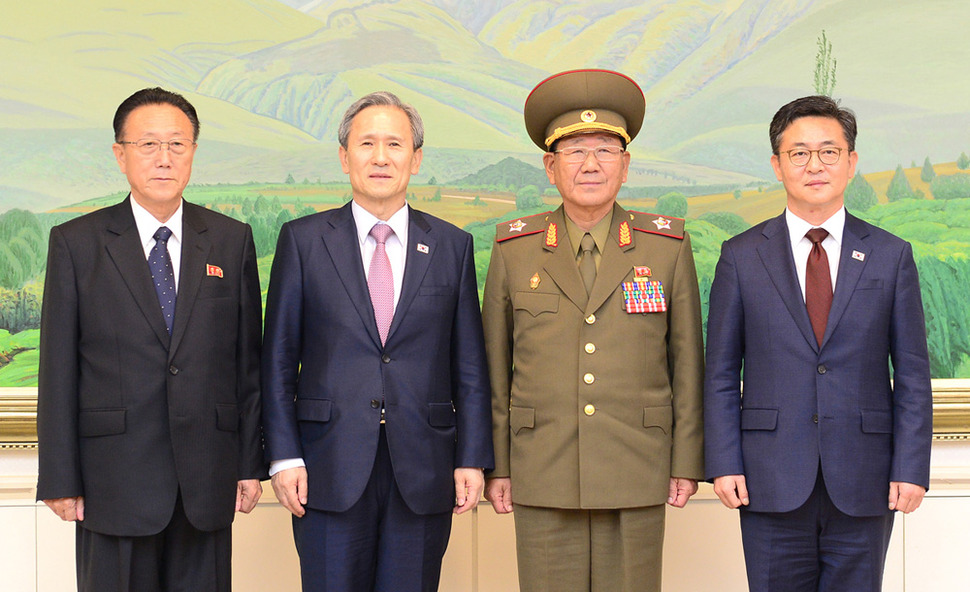Posted on : Aug.25,2015 14:13 KSTModified on : Aug.25,2015 14:13 KST
 |
From left to right, Kim Yang-gon, the head of North Korea’s Workers’ Party United Front Department and secretary on South Korean affairs, Blue House National Security Director Kim Kwan-jin, People’s Army general politburo chief Hwang Pyong-so and Workers’ Party secretary Hwang Pyong-so and Minister of Unification Hong Yong-pyo pose for a photo after agreeing to a Joint Statement, at Panmunjeom Peace House in the early hours of Aug. 25. (provided by the Ministry of Unification) |
Two sides will work to hold senior-level and Red Cross meetings at the earliest possible date
Four sleepless days of inter-Korean negotiations ended with North Korea agreeing to express “regret” for a land mine explosion that injured two soldiers earlier this month and South Korea agreeing to halt its propaganda loudspeaker broadcasts.
The joint agreement from the high-level talks was announced after negotiations concluded early in the morning of Aug. 25. In its second item, North Korea expressed “regret” for the injuries suffered by the South’s soldiers due to a mine explosion that recently occurred in the Southern region of the Demilitarized Zone (DMZ) at the Military Demarcation Line (MDL).
While the statement was not the full admission of responsibility and apology that Seoul was demanding for the landmine explosion in Paju, Gyeonggi Province, on Aug. 4, the expression of “regret” appears to have been a happy medium for the South Korean side.
North Korea showed a similar approach in the aftermath of the July 2008 shooting death of South Korean tourist Park Wang-ja at Mt. Keumgang and the November 2010 shelling of Yeonpyeong Island. In both cases, it expressed regret over the casualties without acknowledging responsibility, leading some in the South Korean government to question its sincerity. The fact that Seoul accepted similar language for the mine explosion suggests its priority was to relieve tensions rather than make unrealistic demands.
In the following third item, South Korea indicated that it would “suspend all loudspeaker broadcasts in the Military Demarcation Line area as of noon on Aug. 25, barring any abnormal situations.” If implemented, this would mean Seoul bowing to North Korean objections and halting its propaganda broadcasts fifteen days after their resumption.
The plans do not include fully dismantling its loudspeakers as in 2004, suggesting the South will continue to maintain the loudspeakers placed in eleven locations at the MDL and elsewhere in the wake of the 2010 sinking of the ROKS Cheonan warship.
But the move does represent an abrupt capitulation to demands from the North, which had been objecting vehemently to the broadcasts’ resumption and threatening to “fire at the source.”
Other notable agreements concerned a wide range of other issues after the two sides found common ground on the chief sources of tension with the landmine responsibility and broadcast issues. In the fourth item, North Korea agreed to remove a “quasi-state of war” declaration it made for the front-line region on Aug. 20 - suggesting its priority is now set on creating an environment conducive to dialogue and cooperation as the next step.
Both sides also agreed in the agreement‘s first item to “stage a senior-level meeting in Seoul or Pyongyang at the earliest possible date to improve inter-Korean relations, and to carry out dialogue and negotiations in various areas in the future.” The next question is whether this means a return to previous frameworks for dialogue and negotiations, including ministerial-level and military talks.
The fifth item included plans for working-level Red Cross talks next month for a reunion event for separated family members around the Harvest Festival holiday, while the sixth item concerned “efforts to promote civilian exchange in various areas.”
The question for many is whether this will mean a resumption of civilian exchanges that had previously been stifled by the cancelation of planned joined events for the 15th anniversary of the June 15 Joint Declaration and the Liberation Day holiday and Pyongyang’s decision not to send athletes to an athletic event held in South Korea.
By Kim Oi-hyun, staff reporter
Please direct questions or comments to [english@hani.co.kr]




